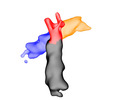+検索条件
-Structure paper
| タイトル | Tertiary folds of the SL5 RNA from the 5' proximal region of SARS-CoV-2 and related coronaviruses. |
|---|---|
| ジャーナル・号・ページ | bioRxiv, Year 2023 |
| 掲載日 | 2023年11月27日 |
 著者 著者 | Rachael C Kretsch / Lily Xu / Ivan N Zheludev / Xueting Zhou / Rui Huang / Grace Nye / Shanshan Li / Kaiming Zhang / Wah Chiu / Rhiju Das /   |
| PubMed 要旨 | Coronavirus genomes sequester their start codons within stem-loop 5 (SL5), a structured, 5' genomic RNA element. In most alpha- and betacoronaviruses, the secondary structure of SL5 is predicted to ...Coronavirus genomes sequester their start codons within stem-loop 5 (SL5), a structured, 5' genomic RNA element. In most alpha- and betacoronaviruses, the secondary structure of SL5 is predicted to contain a four-way junction of helical stems, some of which are capped with UUYYGU hexaloops. Here, using cryogenic electron microscopy (cryo-EM) and computational modeling with biochemically-determined secondary structures, we present three-dimensional structures of SL5 from six coronaviruses. The SL5 domain of betacoronavirus SARS-CoV-2, resolved at 4.7 Å resolution, exhibits a T-shaped structure, with its UUYYGU hexaloops at opposing ends of a coaxial stack, the T's "arms." Further analysis of SL5 domains from SARS-CoV-1 and MERS (7.1 and 6.4-6.9 Å resolution, respectively) indicate that the junction geometry and inter-hexaloop distances are conserved features across the studied human-infecting betacoronaviruses. The MERS SL5 domain displays an additional tertiary interaction, which is also observed in the non-human-infecting betacoronavirus BtCoV-HKU5 (5.9-8.0 Å resolution). SL5s from human-infecting alphacoronaviruses, HCoV-229E and HCoV-NL63 (6.5 and 8.4-9.0 Å resolution, respectively), exhibit the same coaxial stacks, including the UUYYGU-capped arms, but with a phylogenetically distinct crossing angle, an X-shape. As such, all SL5 domains studied herein fold into stable tertiary structures with cross-genus similarities, with implications for potential protein-binding modes and therapeutic targets. |
 リンク リンク |  bioRxiv / bioRxiv /  PubMed:38076883 / PubMed:38076883 /  PubMed Central PubMed Central |
| 手法 | EM (単粒子) |
| 解像度 | 6.5 - 9.0 Å |
| 構造データ |  EMDB-42803: HCoV-229E 5' proximal stem-loop 5  EMDB-42813: HCoV-NL63 5' proximal stem-loop 5, conformation 1  EMDB-42814: HCoV-NL63 5' proximal stem-loop 5, conformation 2 |
| 由来 |
|
 ムービー
ムービー コントローラー
コントローラー 構造ビューア
構造ビューア 万見文献について
万見文献について



 Human coronavirus 229E (ヒトコロナウイルス 229E)
Human coronavirus 229E (ヒトコロナウイルス 229E)